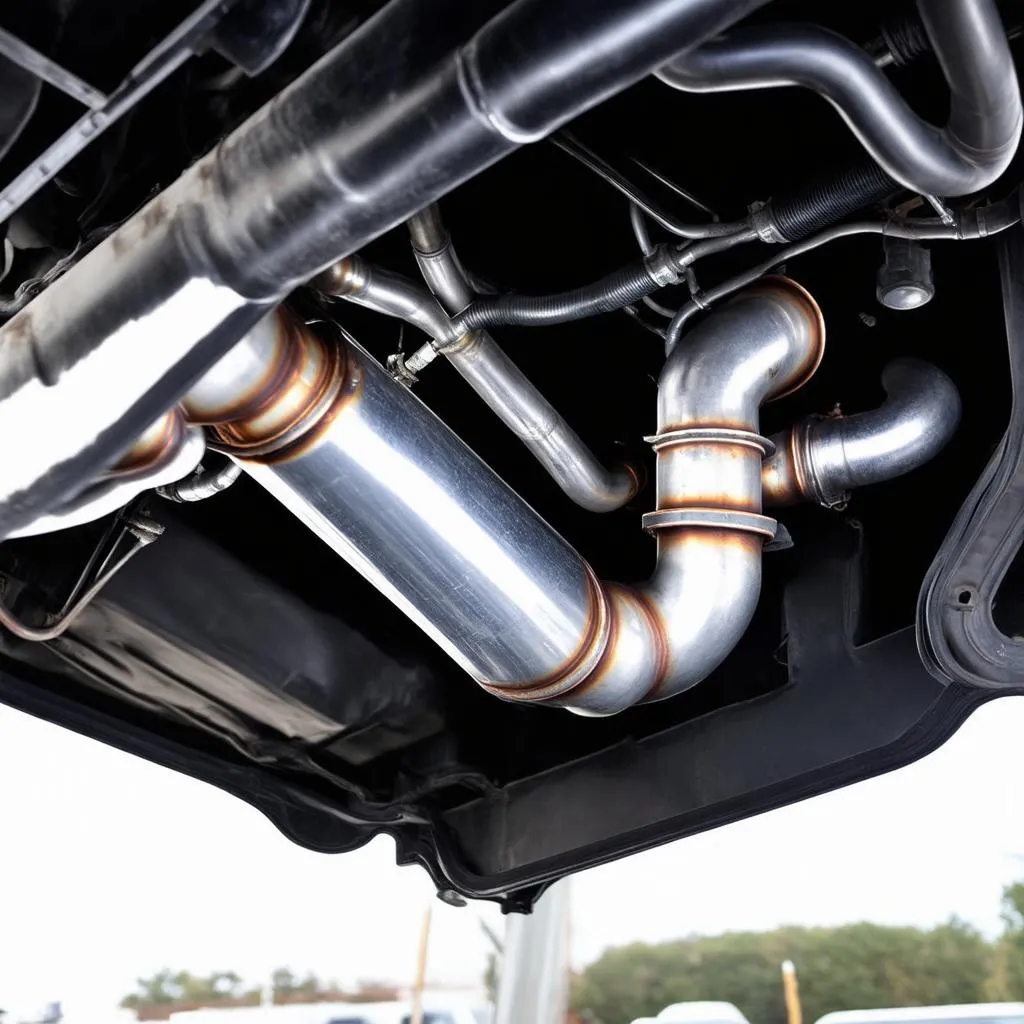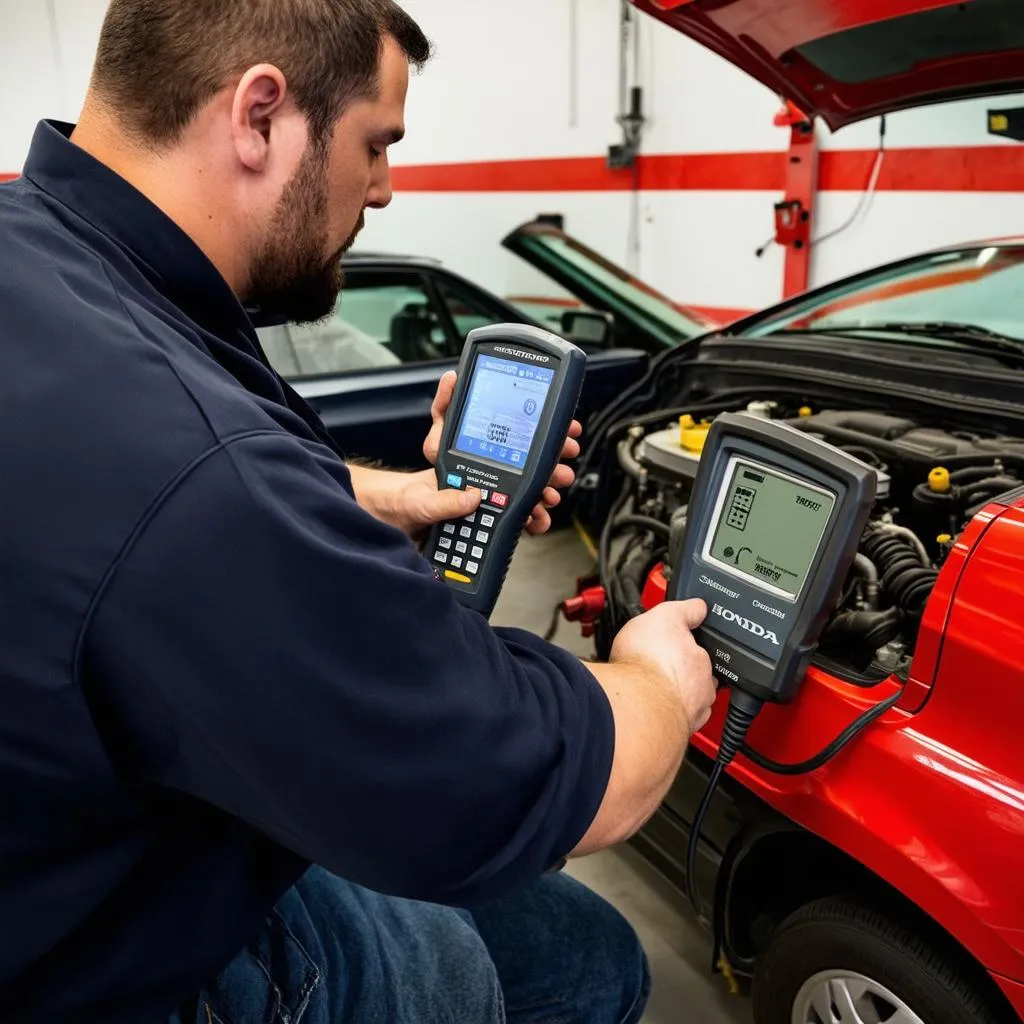Have you ever been cruising down the road, your trusty 1997 Honda Civic humming along, only to be interrupted by that dreaded “Check Engine” light? You hook up your OBD II scanner, your heart pounding a bit faster, and there it is – the cryptic “P0420” code staring back at you. Don’t worry, you’re not alone. The P0420 code is a common issue for 1997 Honda Civic owners, and in this article, we’ll demystify it, explore possible causes, and discuss solutions to get your Civic back on the road running smoothly.
What Does P0420 Mean for My 1997 Honda Civic?
In simple terms, the P0420 code indicates a potential problem with your catalytic converter’s efficiency. Your catalytic converter is a vital part of your Civic’s emissions control system. It works diligently to convert harmful exhaust gases into less harmful substances before they are released into the atmosphere.
Let’s break down the meaning further:
- P0420: This specific code translates to “Catalyst System Efficiency Below Threshold (Bank 1)”.
- Bank 1: This refers to the side of the engine where cylinder #1 is located. Since your 1997 Honda Civic has a four-cylinder engine, there’s only one catalytic converter to worry about.
- Efficiency Below Threshold: This means the oxygen sensors upstream and downstream of your catalytic converter aren’t detecting the expected difference in oxygen levels, suggesting your catalytic converter might not be doing its job effectively.
Think of it like a filter for your exhaust. If the filter is clogged or not working properly, it won’t clean the exhaust as well as it should.
Why is My Check Engine Light On? Common Causes of P0420
Now that we know what P0420 means, let’s delve into the common culprits behind this code in your 1997 Honda Civic:
1. Failing Catalytic Converter
This is, unfortunately, the most common and often the most expensive culprit. Catalytic converters have a lifespan and can deteriorate over time due to high heat and exposure to contaminants.
Story time: Imagine your catalytic converter like a hardworking chef in a busy kitchen (your engine). Over time, the constant heat and exposure to food particles (exhaust gases) can take a toll on even the best chefs!
2. Faulty Oxygen Sensors
While less common than a bad catalytic converter, a faulty oxygen sensor (either upstream or downstream) can also trigger a P0420 code. These sensors play a crucial role in monitoring oxygen levels in the exhaust stream, providing data to your car’s computer to adjust the air-fuel mixture.
Think of it this way: If the “taste testers” in the kitchen (oxygen sensors) can’t accurately assess the dish (exhaust gases), they might send the wrong information back to the chef (engine control unit).
3. Exhaust Leaks
Leaks in your exhaust system, particularly before the catalytic converter, can disrupt exhaust flow and oxygen readings, potentially triggering a P0420 code.
4. Engine Performance Issues
Underlying engine problems, such as misfires or a rich fuel mixture, can also damage your catalytic converter over time and lead to a P0420 code.
It’s all connected: Just like a chain reaction, issues in one part of your car’s system can impact others.
Can I Still Drive My Honda Civic with a P0420 Code?
You might be tempted to ignore the Check Engine light, especially if your Civic seems to be running fine. However, driving with a P0420 code for an extended period is not recommended for several reasons:
- Potential for Further Damage: Ignoring the problem could lead to more serious and expensive repairs down the road, such as a completely clogged catalytic converter or damage to other engine components.
- Increased Emissions: A malfunctioning catalytic converter can’t effectively reduce harmful emissions, contributing to air pollution.
- Failed Emissions Test: In most areas, a P0420 code will cause your vehicle to fail an emissions test, preventing you from renewing your registration.
How Do I Fix a P0420 Code?
Here’s where things get a little more technical. Diagnosing and fixing a P0420 code often requires some mechanical expertise and specialized tools. Here are the steps involved:
-
Verify the Code: Before diving into repairs, it’s always a good idea to double-check the code using a different OBD II scanner.
-
Inspect for Leaks: A thorough inspection of your exhaust system for leaks is crucial.
-
Check Oxygen Sensor Function: A mechanic will use a scan tool to monitor the oxygen sensor readings and ensure they are functioning within the correct parameters.
-
Diagnose Engine Performance: If the oxygen sensors and exhaust system check out, the mechanic will move on to diagnosing potential engine performance issues that could be contributing to the problem.
-
Replace Faulty Components: Depending on the diagnosis, this could involve replacing the oxygen sensor(s), repairing exhaust leaks, or, in many cases, replacing the catalytic converter.
Expert Insight: According to automotive engineer Dr. Emily Carter, author of “The Complete Guide to Automotive Emissions Systems,” “While replacing a catalytic converter can be costly, it’s essential to address the root cause of the P0420 code to ensure long-term engine health and prevent future emissions problems.”
Taking Care of Your Catalytic Converter
Prevention is key! Here are some tips to help prolong the life of your catalytic converter and avoid future P0420 headaches:
- Address Engine Issues Promptly: Don’t ignore those pesky Check Engine lights! Addressing engine misfires, a rich fuel mixture, or other engine performance problems can prevent damage to your catalytic converter.
- Regular Maintenance: Follow your Honda Civic’s recommended maintenance schedule, including regular tune-ups and oil changes.
- Use Quality Fuel: Using high-quality fuel and avoiding contaminated gasoline can help keep your catalytic converter clean and functioning optimally.
 1997 Honda Civic Catalytic Converter
1997 Honda Civic Catalytic Converter
FAQs About P0420 Codes in 1997 Honda Civics:
Q: Can I just replace the oxygen sensor myself to fix the P0420 code?
A: While replacing an oxygen sensor is possible for DIYers, remember that the P0420 code can stem from various issues. Simply replacing the sensor without addressing the root cause might not solve the problem and could be a waste of time and money.
Q: How much does it cost to replace a catalytic converter on a 1997 Honda Civic?
A: The cost can vary depending on whether you opt for an OEM (Original Equipment Manufacturer) or aftermarket catalytic converter and labor costs in your area. On average, expect to spend between $500 and $1000 for the part and installation.
Q: Will clearing the code make it go away permanently?
A: Temporarily clearing the code might turn off the Check Engine light, but if the underlying problem persists, the code will return. It’s essential to diagnose and fix the root cause.
 Mechanic Diagnosing P0420 Code
Mechanic Diagnosing P0420 Code
Need More Help with Your Honda?
Dealing with car troubles can be stressful, but at techcarusa.com, we’re here to help. If you’re struggling with a P0420 code or any other automotive issue, don’t hesitate to reach out to our team of experts. We offer a wide range of resources, including:
- In-depth articles and guides on various car repair topics
- Reviews of the latest diagnostic tools to help you troubleshoot problems yourself
- A community forum where you can connect with other car enthusiasts and share your experiences
For personalized assistance, contact our dedicated support team via WhatsApp at +84767531508. We’re available 24/7 to answer your questions, provide guidance, and help you get back on the road safely.
Keep Your Honda Civic Humming!
Remember, regular maintenance and addressing car problems promptly are the best ways to ensure your 1997 Honda Civic provides you with miles of reliable and enjoyable driving.
